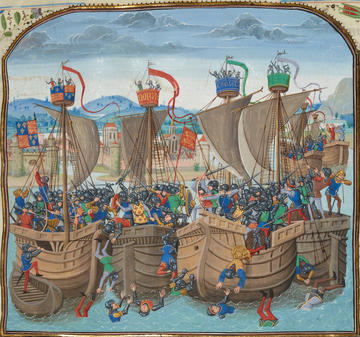Workshop report: Beginnings of the Fiscal-Military System
From the Middle Ages to the early modern period

Battle of Sluys (1340). Jean Froissart, Public domain, via Wikimedia Commons
As historians, the question of change is essential to our work. At the end of April 2022, the project team discussed questions of historical change and periodisation with our advisory board and further experts, focussing on beginnings and endings. Was there enough change around 1530 that it warrants to speak of a newly developing fiscal-military system? And did warfare and its relation to the state change again in such fundamental ways that it became something different from the fiscal-military system in the late 19th century, ca. 1870? These two questions were at the core of our discussions which very quickly developed into a very lively exchange of ideas and knowledge of political, military, and economic history from the Middle Ages until the 20th century. This first blog post retells our discussions and results on the beginnings of the system, and how it differs from medieval forms of war organisation. It thus is based on the first of two meetings, and our results from the second meeting – on the endings of the fiscal-military system – will be presented in a second post.
We started with a very important question (VIQ 😉 ) – how eurocentric is our project, and shouldn’t global aspects and comparisons not be much more included than we, admittedly, do? This question, though quickly delegated to the second part of the workshop which focussed on the endings in the 19th century, formed nonetheless a background also of the discussion of the period of change around 1530. In addition to our advisory board, Steve Gunn , Hannah Skoda , Bill Caferro, and John Watts – four experts on the Middle Ages, brought in their knowledge. With globalisation still on our minds, the crusades (both in the Mediterranean as well as in the Baltic) were quickly identified as relevant predecessors of the later fiscal-military system, encompassing several European powers and polities working together to wage war. In the discussion, we acknowledged the essential role of networks and logistics - then and later. Still, and hopefully other medievalists will agree, essential differences remain between going to war against powers, contemporaries identified as “other” than Christian Latin Europe, and going to war against each other within Europe (and spreading those wars throughout the world).
The importance of changes in the intellectual and moral justification of war and of its financing (yes, we’re talking credit and subsidies here) were a further point of discussion, and emphasized that there is indeed very wide-reaching change. It is not for nothing that attempts, e.g., in late medieval England to raise loans and mobilize huge sums for warfare failed whereas those same attempts succeeded in the early modern period in a system with established financial hubs and a change of thinking about credit. These changes went hand-in-hand with shifts to political culture and reason of state including ideas about warfare, but also with new moral questions on licensing of firearms or the engagement in weapon trade, as well as a shift of perceptions of trading soldiers being equal to trading slaves. The latter once again a discussion which is prevalent in the late Middle Ages, especially in the Mediterranean, but has a much different quality in the 19th century.
Together with a change of thinking about credit and morality, polities from the early sixteenth century onwards (timing is dependent on geographical region – earlier in Italy or Flanders, later in the Baltic) are able to profit from a more sophisticated financial system/monetisation in the hubs, and an increased fiscal capacity within their own bureaucracies as well as in their international relations via a more professionalized diplomacy. This relates much to traditional narratives of state formation and development, and also touches upon process such as information revolution, reformation and confessionalisation as well as the reduction of polities into bigger composite monarchies.
Coming from some of these very general impressions of historical change and continuities, our discussion soon turned to more detail. Standardisation in hiring of troops is one of the characteristics of the early modern Fiscal-Military System, not seen as such in the Middle Ages. While hiring of foreign soldiers was not unknown, the hiring of fully formed regiments, usually with the help of more and more standardized treaties began in earnest in the middle of the 16th century, and connects with well-known developments in the military revolution (e.g., growing importance of infantry and specific formations). Growing centralised states formed a demand which they could only fulfil with connected places of supply – the hubs as central elements of the whole system. Standardisation occurred not only in regimental organisation or in treaties, but also on the side of war materials (firearms, ammunition, artillery), supply chains, diplomacy, trade (e.g., gunpowder), and re-organisation of militias.
Growing further away from the question of beginnings, our expert panel expressed interest in several questions we do hope to at least touch upon with our research: e.g., which expected hubs did not become fiscal-military hubs, and why not? Examples for this are certainly Barcelona, Cadiz, Lisbon, or Lübeck. Or, how important was specialisation in logistics – both for hubs and for individual people? Was the demand of early modern states large and consistent enough to justify specialisation of fiscal-military contractors and other actors to focus only on wars?
In the end of the beginnings-discussion, we were reassured that there is indeed something new happening in warfare organisation around 1530 – these changes do connect to changes in political culture, business practice, population and scale of authority, intellectual and moral ideas, as well as technology and urbanisation. As such, the emergence of a fiscal-military system different from medieval warfare adds to our general understanding of the early modern period as different to the Middle Ages, and brings together various well researched threads of discussion in a new perspective.


